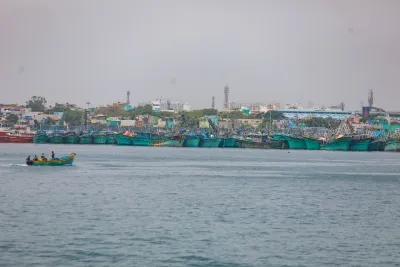What Happened After the 61-Day Fishing Ban in TN?

Synopsis
Key Takeaways
- Over 200 boats returned with a significant catch after the ban.
- The harbour saw a surge in trade and demand for various fish species.
- Fishermen are seeking government support for fuel price reductions.
- Fishing leaders emphasized the importance of sustainability.
- The annual ban coincides with the breeding season for marine life.
Chennai, June 18 (NationPress) Following a 61-day seasonal fishing ban, more than 200 mechanised boats departed from the Thoothukudi fishing harbour in Tamil Nadu, returning with a significant fish catch that delighted both fishermen and traders. The vessels set sail around 5 a.m. on Tuesday and returned by 9 p.m., bringing back tonnes of fish, including sala, uli, paarai, seela, kanava, anthili, and ailai.
The harbour experienced a surge in fish supply for the second consecutive day, resulting in vigorous trading activity and robust demand from buyers throughout Tamil Nadu and Kerala. The prices mirrored this demand: a basket of sala was priced at Rs 2,000, while vilai sold for Rs 4,500 - Rs 6,000. Additionally, anthili fetched Rs 4,500, paarai for Rs 6,000, and uli was priced between Rs 7,500 - Rs 10,000.
Premium varieties like seela were sold at Rs 900 per kilogram, with fish varieties like ponnamparai and ailai averaging Rs 2,500 per basket.
The harbour buzzed with activity as locals and wholesalers gathered to purchase the fresh catch. Fishermen expressed their satisfaction over the profitable beginning to the season; however, they urged the Central and state governments to lower diesel prices and taxes to alleviate the financial strain on boat operators.
R.J. Bosco, secretary of the Thoothukudi Mechanised Boat Owners Association, described the day’s catch as promising. “Each boat incurs a daily cost of approximately Rs 2.15 lakh on diesel, ice, and labour. Fortunately, the average catch was valued around Rs 3 lakh, just above the break-even point. A single trawler uses about 1,200 litres of diesel per fishing trip,” he elaborated.
Most boats reported good catches of para, ooli, and karal.
In Kanyakumari, boats also resumed operations after the two-month fishing ban off the district’s coast ended on Sunday. Several boats that ventured out early Monday returned by Tuesday night with large quantities of fish, including kingfish, pomfret, prawns, and shrimps, with a total estimated value of Rs 5 crore.
Fishing leaders noted that each boat brought back around four tonnes of high-value catch, attracting traders from nearby districts and neighbouring states. The annual fishing ban in April and May aligns with the breeding season and aims to conserve marine life and ensure long-term fish stocks in the region.









